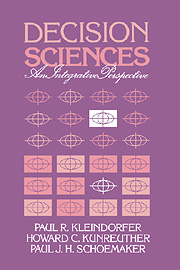Book contents
9 - Societal decision making
Published online by Cambridge University Press: 05 June 2012
Summary
Introduction
This chapter investigates alternative approaches for dealing with problems that not only affect individuals but also have important societal consequences. Such problems typically involve a broad spectrum of interests, from consumers and businesses to special interest groups and government agencies. Our particular focus is on low-probability, high-consequence events, as these bring out clearly the importance of understanding decision processes for prescribing public policy. More specifically, biases are known to exist regarding the way different interested parties deal with risks. Society is now struggling with many of these issues, and they will assume even more prominence as technology advances. The problems include such diverse areas as automobile safety, energy, environment, natural and technological hazards, consumer product safety, and occupational risks.
Based on an understanding of the decision processes of the different actors, what type of policy tools should be utilized in allocating resources? Frey and Eichenberger (1989) suggest that private markets may be inefficient when there is uncertainty because of individual limitations in collecting and processing information on the risk. For example, motorists know that their chances of being involved in an accident are low, but few can specify the probabilities of being injured, or whether driving to work is more or less dangerous than a trip on the open highway which takes twice as long. There is a general awareness that protective mechanisms, such as seat belts or air bags, will reduce the impact of an accident, but little thought is generally given to the specific benefits of using these devices.
- Type
- Chapter
- Information
- Decision SciencesAn Integrative Perspective, pp. 344 - 384Publisher: Cambridge University PressPrint publication year: 1993



